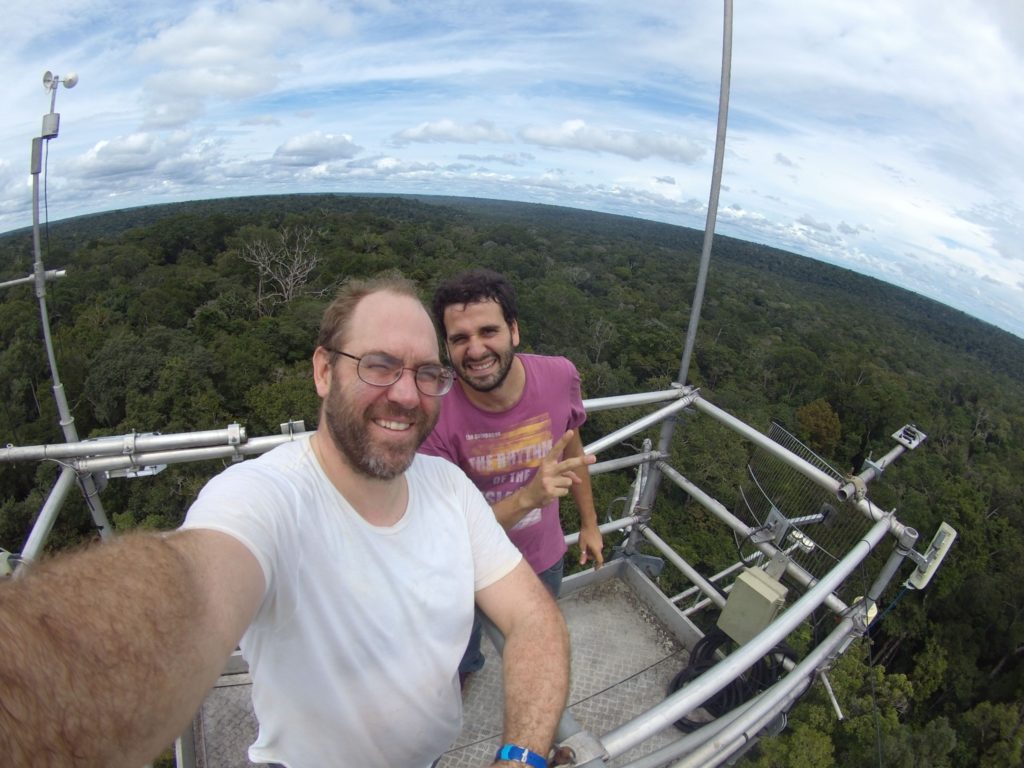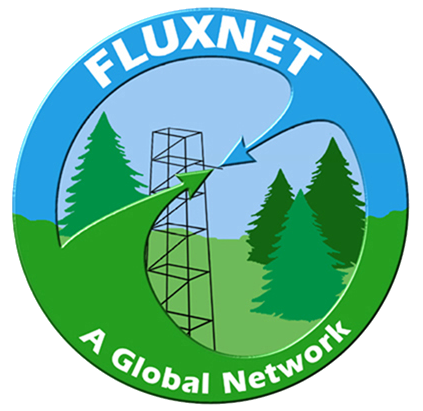This month, we are pleased to interview Kolby Jardine. Kolby is a Research Scientist in the Ecology Department within the Climate & Ecosystem Sciences Division of Lawrence Berkeley National Laboratory. He studies plant and microbial metabolism by working at the interface of biochemistry, ecology, and atmospheric sciences (Biochemical Ecology). He developed field, greenhouse, and laboratory methods to quantify carbon dioxide and gas-phase volatile organic compound (VOC) concentrations, fluxes, and isotopic composition from leaves to ecosystems and from seconds to seasons. Besides science, he enjoys outdoor adventure, which in turn greatly benefits his research and career. We interviewed him to learn his research using gas exchange methods from leaves to ecosystems and his career path combining science and outdoor adventures.
Please tell us briefly about your path on science and adventure

Fig.1 Kolby in the central Amazon in 2017
My career in “adventure science” began when I was a kid, playing outside and learning about the world around me. Today, inspiration for my research on how water, soil, vegetation, and the atmosphere interact with one another comes from my science adventures around the world, whether it’s taking in the smells of low tide in California, rejoicing in the existence of spring in the desert, watching the lightning storms in the summer monsoon, or marveling at the immense diversity of life in the Amazon rainforest. Experiencing life outside the lab has been essential to my success in developing a scientific career. I trained in a variety of fields to get to my current interdisciplinary position, and along the way, have come to view science as a great adventure instead of as a job. I learned to be creative, to never stop learning, to take risks, to make mistakes, and to listen to my instincts — before going with the accepted norms.
(1) Nature break
I guess you could say that I have had an untraditional career path across several disciplines. I started my formal science training in 1995 as an undergraduate in Chemical Engineering at the Colorado School of Mines in Golden. Midway through my degree, I decided to pursue Biochemistry, inspired by a lab experience in which I researched how microbes influence biogeochemical cycles. After a summer internship in an Evolutionary Biology lab at Harvard University where I learned about genetics and molecular biology, I started a Biochemistry degree at New York University. In 1999, I entered a Ph.D. program in Optical Nanotechnology at Arizona State University with an interest in building light-powered nanoscale bio-molecular devices.
But years of tireless work and the lack of a break led me to burnout. Searching for a way back to happiness, I devoured a book titled Beyond Backpacking written by my uncle Ray Jardine, an aeronautical engineer turned outdoor inventor, author, and adventurer. I realized that a long backpacking trip was what I needed for myself. So, 1 year into my Ph.D.s, I quit my program, sold all my furniture, books, etc, and spent the following 6 months training for and thru-hiking the Arizona Trail. From this journey, I learned to focus on skills rather than gear, to live a rigorous physical, mental, and spiritual life, and to develop strong connections with Earth. Inspired by my incredible journey, I returned to Colorado and devoted all my energy to teaching myself the art of traditional rock climbing, cross-country skiing, kayaking, and mountain biking. To sustain me, I took a job teaching algebra, chemistry, and microbiology at San Juan College in Farmington, New Mexico.
(2) Back to academia
No matter how burned out I was back then and how much I had enjoyed my outdoor adventures, the experience of suddenly quitting research — something I had been working toward my whole life — had nonetheless been very difficult. So, a couple of years later when I went back to research, I was determined to make it work by adopting an unconventional approach: blending my research and outdoor activities.
I returned to graduate school in spring 2003, pursuing a master’s degree in Atmospheric Chemistry at the South Dakota School of Mines and Technology. I worked on characterizing the organic chemistry of forest air by measuring the flux of VOCs, trace gases released into the atmosphere during plant metabolism that exert a large influence on air quality and climate at the leaf, plant, and ecosystem scales. I participated in field campaigns in grasslands, agricultural fields, the Black Hills of South Dakota, and Duke University’s experimental forest. These fieldworks gave me plenty of opportunities for camping, rock climbing, backpacking, and mountain biking, which further excited me about my science projects.

Fig.2 My first field experiment at the University of Michigan Biological Station (2006) where I measured the fluxes of VOCs into and out of the soil and litter
After graduation, I started my Ph.D. in Marine and Atmospheric Sciences at Stony Brook University. I continued my work on VOCs, stable carbon isotope composition, and land-atmosphere exchange. My conscious efforts to focus on my love of the outdoors were successful: Unlike my experience with the Ph.D. program in Arizona, my newly chosen field gave me the chance to experience science in the wild and regularly top up my motivation and energy levels. Of the many skills I learned during my Ph.D., the most important ones were the focus, endurance, and the unwillingness to quit whatever the challenges. Following my graduation, I applied these skills to an ambitious outdoor adventure.
(3) International exploration
After my Ph.D. graduation in 2008, I completed the 3000-mile Great Divide Route from Mexico to Canada through the Rocky Mountains by tandem bike with my wife. Just like during the Ph.D., a multitude of obstacles were thrown in my path: dehydration, exhaustion, deep snow, intense headwinds. I knew that if I focused on the negatives, I would miss the glory of the trail and surely quit. Instead, I focused on the beauty of the landscape, how changes in water availability had been crafting it over time, how simply I could live, and the abounding wildlife around. Besides enjoying the beauty of nature, it’s also a productive trip for science. I published a paper from my dissertation and secured a postdoc position at the University of Arizona’s Biosphere 2 center during the trip using a solar-powered laptop.

Fig.3 Me together with my best Brazilian friend and colleague on top of the K34 tower in the central Amazon where we measured the flux of VOCs between the forest and the atmosphere using the vertical gradient technique (2016).
After the summer break, I returned to Arizona on a wave of positivity. I study primary carbon and energy metabolism and its connection with VOCs in the rainforest and desert biomes at Biosphere 2 and connected these studies to VOC flux campaigns in the Brazilian Amazon (BrazilianAir) and the Sonoran Desert (CREATIVE). The experience in Amazon brought me back to Amazon again several years later as a project scientist at Berkeley Lab to lead the terrestrial ecosystem component of the GoAmazon 2014/5 project. I developed and tested an advanced VOC flux lab focusing at the leaf, branch, and ecosystem scales and deployed this lab to the National Institute of Amazonian Research (INPA) in Manaus, Brazil for a 6-year field deployment that extended into phase 1 of Net Generation Ecosystem Experiments (NGEE)-Tropics. While in the Amazon, I went on countless stand-up paddling and kayak expeditions where I explored the vast Amazon Basin surrounding Manaus, absolutely marveling at the amazing diversity of the forest.
My outdoor adventure continues after I was back in California. My family is currently working on biking the Pacific Coast from San Francisco to Los Angeles and kayaking the Russian River as well as exploring the Sierras. Thus, my journey through science and pursuit of outdoor challenges go hand in hand. Much like many of the Earth system processes I study, my science and outdoor activities form a positive feedback loop where learning in one promotes learning in the other. No matter how short or long outdoor adventures are, I always come back with fresh new ideas and questions for research. In turn, my research always generates new goals and methods for outdoor adventures.
What are your unforgettable moments/fun stories working in the field?
My memorable moment often happened during my kayaking expeditions, jungle hiking, and camping trips, which took me up and close to the seemingly largest fish, jaguar, and anaconda in the Amazon! Out of all of them, the anaconda was probably the most dangerous. One day, after making a crossing of the Rio Negro by inflatable kayak to a remote island, I heard a splash in the water and thought it was a dolphin as we often saw lots of dolphins. The next thing I saw was a huge anaconda passing beneath my inflatable sit on top boat. I often would get into the dark waters after doing a lot of paddling in the sun to cool off. If I had done that here, I would probably not be here to tell the story! Not as dangerous perhaps but even scarier, I was on the 5th day of a kayak trip down the remote Urubu river, and just as the river was opening up and getting big as it approached the Amazon River, I heard a splash, looked over my shoulder, and saw what looked like the middle portion of the largest snake-looking fish creature in the River! I was so paralyzed with fear that I could not even paddle, and suddenly the current swept me downstream….
Another memorable moment for me was during the Amazon field campaign. I often woke up at 4 AM to hike to the flux tour for an hour in the dark carrying lots of equipment. One morning in the dark on the slippery trail, I saw a huge snake coiled on the trail in a strike position. I screamed and threw a small stick near it from afar but he would not move! So I walked away for 10 minutes and it was gone when I came back. I fearfully ran past in the dark on the slippery and muddy trail praying that it had really left and was not waiting on the side of the trail for me to return.
What advice would you give to other new beginners when working with flux instruments and measurement?
The advice that I have for new researchers is to consider learning about stable isotopes, systems design and automation, and to learn a few sensors well so that you can understand the data and repair the system when they break. The other advice that I have is to spend time at different field sites or contrasting ecosystems and to gain international experience. But above all, it’s really important that one follows his/her own path. To quote my uncle Ray Jardine, “No one can live my life for me, or you. In the end, you can’t worry about what other people think, you’ve just got to do what you think is right”.
Relevant links:
In Person: How Our Adventures Led to Careers in Science: https://www.sciencemag.org/careers/2010/09/person-how-our-adventures-led-careers-science
EESA career path seminar talk: https://www.youtube.com/watch?v=vNVAnuwez8E
Google Scholar https://scholar.google.com/citations?user=RqMMmewAAAAJ&hl=en
Research Gate https://www.researchgate.net/profile/Kolby-Jardine
